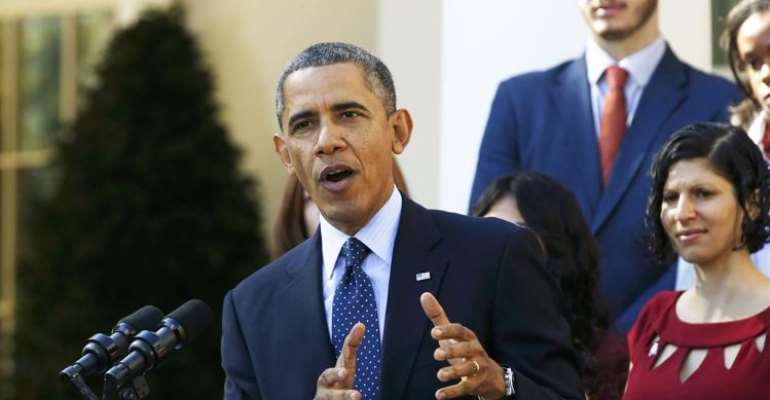Are Obama’s ratings dipping past the point of no return?

Barack Obama’s second term fumbles have pitched him to record low poll ratings and splintered his credibility with the American people.
But has his presidency reached the point of no return?
History and opinion poll data suggest that when reelected presidents slump in the ratings, it is tough, if not impossible to bounce back.
Obama, stung by the amateurish debut of his health care plan, which has sent fellow Democrats into revolt, is beginning to sense the depth of his woes.
“I do make apologies for not having executed better over the last several months,” he said at a Thursday press conference, punctuated by uncharacteristic mea culpas.
“Am I going to have to do some work to rebuild confidence around some of our initiatives? Yes.”
He had better act fast.
An NBC/Wall Street Journal survey two weeks ago had the president's approval rating down to 42 percent. A week later, Pew Research put Obama at 41 percent. By Wednesday, Quinnipiac University had him at 39 percent, a new low.
The data suggest Obama can no longer count on the solid floor of support that has sustained his crisis-strewn presidency.
“For the first time it appears that 40 percent floor is cracking,” said Tim Malloy, assistant director of the Quinnipiac University Polling Institute.
But do polls matter for a man who will never again be on the ballot?
Second term presidents enjoy some freedom from the tyranny of their job ratings — and become more obsessed with staving off dreaded lame duck status.
But Obama’s deteriorating image threatens to shred his remaining authority on Capitol Hill — where key priorities, including immigration reform are on life support.
He is also pleading with sanctions-wielding senators for more time to do a nuclear deal with Iran.
And Obama’s unpopularity is spooking Democrats with tough races in next year’s mid-term elections, which may doom his long-shot hopes of seeing his party recapture the House of Representatives.
Already, Obama is getting the cold shoulder from vulnerable Democrats, including Louisiana Senator Mary Landrieu who is brandishing her own bill to clean up the Obamacare mess.
Charlie Cook, a renowned political analyst, suggests Obama’s presidency is suffering a “classic case of second term fatigue.”
Bill Clinton saw his second term consumed by a sex scandal, George W. Bush was brought low by Iraq and Ronald Reagan struggled through the Iran-Contra scandal.
Obama’s self-inflicted wound is the jammed Affordable Care Act website and his discredited promise that if Americans liked the health insurance they already had, they could keep it.
The damage is obvious: Quinnipiac found that by 52-44 percent, people thought their president was not honest.
“Any elected official with an eight point deficit is in serious trouble,” Malloy said.
Obama’s spokesman Jay Carney offered the timeworn politician’s trope that his boss did not “spend a lot of time, worrying about ups and downs in polls.”
But no president in the last 60 years who has got into deep polling trouble in their second term has been able to bounce back
Only Dwight Eisenhower and Clinton bettered their approval ratings after one year of their second term before leaving town — and they were popular to start with.
Worryingly for Obama, the president whose polling track he most resembles at this point is George W. Bush, who slunk out of Washington with a pitiful 34 percent approval.
Still, Obama is lucky in his enemies: Republicans are down at 30 percent approval after a government shutdown and debt ceiling debacle last month.
Obama has also defied political logic before — historical portents had suggested that saddled with a sluggish economy and approval ratings of under 50 percent for much of his first term he would not get a second.
After better than expected jobs data last week, some believe if fixes to Obamacare that the president unveiled on Thursday work — a big if — he could be spared long term political damage.
“The question now, is whether he will continue to go down, as Bush did,” said Carroll Doherty, an associate director of the Pew Research Center for the People and the Press.
“A lot depends on what happens with the health care law and a lot depends on the economy.” THE SIDESHOW
